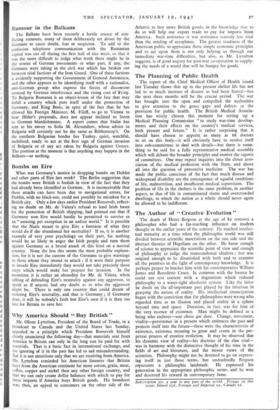The Planning of Public Health
The report of the Chief Medical Officer of Health issued last Tuesday shows that up to the present shelter life has not led to so much increase of disease as had been feared—but the next three months will be the crucial period. The war has brought into the open and compelled the authorities to give attention to the grave gaps and defects in the provision for public health. The British Medical Associa- tion has wisely chosen this moment for setting up a Medical Planning Commission " to study war-time develop- ments and their effects on the country's medical services, both present and future." It is rather surprising that it should have chosen to appoint as many as 68 doctors to sit on this body—it will obviously have to resolve itself into sub-committees to deal with details—but there is some- thing to be said for a fully representative medical assembly which will debate the broader principles and receive the reports of committees. One may expect inquiries into the closer asso- ciation of the medical profession with the State, and above all into the question of preventive medicine. The war has made the public conscious of the fact that much disease and widespread disability are the consequence of squalid conditions of life, malnutrition, and insufficient medical supervision. The problem of life in the shelters is the same problem, in another aspect, as that of life in contaminated slums and overcrowded dwellings, to which the nation as a whole should never again be allowed to be indifferent.


























 Previous page
Previous page